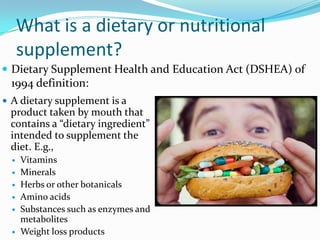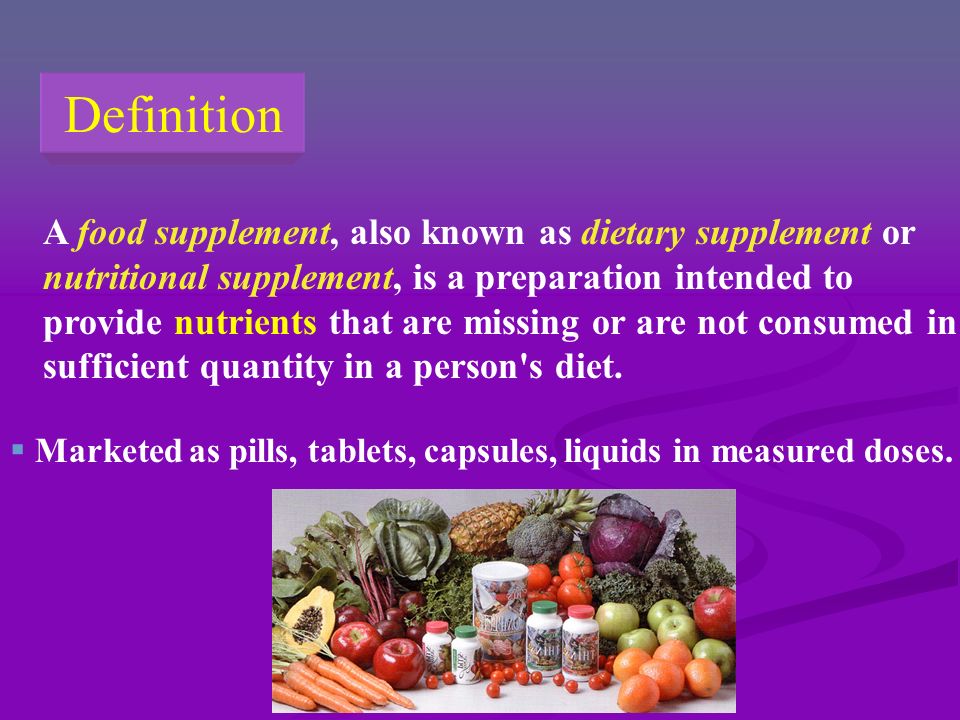In this informative article, you will discover what exactly a food supplement is and its significance in promoting overall health and well-being. You will learn about the various forms and types of food supplements available, as well as how they can complement your diet to ensure you are meeting your nutritional needs. So, if you have ever wondered about the role of food supplements in your daily routine, read on to gain a better understanding of their benefits and how they can support your journey towards a healthier lifestyle.

This image is property of www.efsa.europa.eu.
Definition of Food Supplement
Explanation of food supplement
A food supplement, also known as a dietary supplement, is a product specifically designed to supplement and enhance the nutritional value of a person’s diet. It is intended to provide essential nutrients that may be lacking in one’s regular diet, or to promote the overall well-being and health of an individual.
Food supplements come in various forms, including capsules, tablets, powders, liquids, and gummies. They typically contain vitamins, minerals, herbs, or other bioactive substances that are extracted or synthesized and then formulated into a convenient and easily consumable product.
Legal definition of food supplement
The legal definition of a food supplement may vary between countries, but it generally refers to a product that is intended to supplement the diet and is not considered a replacement for food. In most jurisdictions, food supplements are regulated as a category of food rather than as drugs.
In the United States, food supplements are regulated by the Food and Drug Administration (FDA) as a subset of foods. They are subject to specific labeling requirements and must adhere to certain manufacturing standards. Similarly, in the European Union, food supplements are regulated under the European Food Safety Authority (EFSA) and must comply with the guidelines outlined in the Food Supplements Directive.
Types of food supplements
Food supplements can be categorized into different types based on their composition and intended use. Some common types of food supplements include:
-
Vitamins and minerals: These supplements provide essential micronutrients that may be lacking in the diet. They include vitamins like vitamin C, vitamin D, and minerals like iron, calcium, and zinc.
-
Herbal extracts: These supplements contain extracts from various plants, such as ginkgo biloba, echinacea, or turmeric. They are often used for their potential health benefits or traditional medicinal purposes.
-
Amino acids and proteins: These supplements contain individual amino acids or protein blends that can help support muscle growth and repair, especially in athletes or those engaging in intense physical activity.
-
Probiotics and prebiotics: Probiotic supplements contain live bacteria that support a healthy gut microbiome, while prebiotics act as food for these beneficial bacteria. They can help improve digestion and overall gut health.
-
Other specialized supplements: There are various other food supplements available in the market, including those aimed at promoting joint health, cardiovascular health, brain function, and weight management.
Purpose of Food Supplements
Role of food supplements in nutrition
Food supplements play a critical role in supporting optimal nutrition, particularly when individuals may not obtain sufficient nutrients from their diet alone. They bridge the nutritional gap by providing essential vitamins, minerals, and other bioactive substances necessary for proper bodily function.
While a well-balanced diet is always the foundation of good health, certain factors such as dietary restrictions, food allergies, lifestyle choices, or inadequate food options may lead to deficiencies or imbalances in nutrient intake. In such cases, food supplements can be beneficial in ensuring proper nutrient levels and preventing deficiencies.
Target audience for food supplements
The target audience for food supplements is diverse and includes individuals of all age groups, from infants to the elderly. Certain groups may have specific nutritional requirements or lifestyle factors that make supplementing their diet necessary.
Athletes and physically active individuals often turn to food supplements to support their performance, muscle recovery, and overall well-being. Pregnant women may require additional nutrients like folic acid or iron to support the healthy development of the fetus. Similarly, older adults may need supplements to support bone health or cognitive function.
Benefits of food supplements
The benefits of food supplements are numerous and can vary depending on the specific supplement and individual needs. Some potential benefits of food supplements include:
-
Prevention of nutrient deficiencies: Food supplements can help prevent deficiencies in vitamins and minerals that are essential for overall health and well-being.
-
Support for specific health conditions: Certain supplements are designed to support specific health conditions, such as joint health or digestive health.
-
Enhanced exercise performance and recovery: Athletes and physically active individuals may benefit from supplements that support muscle growth, recovery, and energy production.
-
Improved immune function: Some supplements, such as vitamin C or probiotics, may help boost the immune system and reduce the risk of infections.
-
Support for age-related issues: Older adults may benefit from supplements that support bone health, brain function, or cardiovascular health.

This image is property of www.safefood.net.
Regulation of Food Supplements
Government regulations on food supplements
Food supplements are regulated by government authorities to ensure their safety, quality, and efficacy. The specific regulations vary between countries, but most jurisdictions have established guidelines and standards for the manufacturing, labeling, and marketing of food supplements.
In the United States, the FDA regulates food supplements under the Dietary Supplement Health and Education Act (DSHEA) of 1994. This act requires manufacturers to notify the FDA of their intent to sell a dietary supplement and ensures that products are safe and accurately labeled. However, the FDA does not approve or review the efficacy of dietary supplements prior to their marketing.
Similarly, the European Union has regulations in place to ensure the safety and quality of food supplements. The European Food Safety Authority (EFSA) evaluates the scientific evidence for nutrient sources and health claims made by manufacturers. Supplements must meet specific requirements outlined in the Food Supplements Directive.
Labeling requirements for food supplements
Food supplement labeling is an important aspect of regulation to provide consumers with accurate information about the product. Labels must include the product’s name, net quantity, list of ingredients, directions for use, and any warnings or cautionary statements.
Manufacturers may also include specific health claims or statements on the packaging, provided they are supported by scientific evidence and have been approved by the relevant regulatory authorities. These claims may indicate the intended benefits of the supplement, such as “supports immune health” or “promotes heart health.”
Safety and quality control measures
To ensure the safety and quality of food supplements, manufacturers are subject to various quality control measures. This includes good manufacturing practices (GMP), which are regulations and guidelines for facilities and processes involved in the production of supplements.
GMP standards cover areas such as ingredient sourcing, manufacturing processes, quality testing, and product storage. Compliance with GMP ensures that supplements are produced in a consistent manner and meet established quality standards.
Additionally, regulatory authorities may conduct inspections and audits of manufacturing facilities to ensure compliance with safety and quality standards. Adverse event reporting is also required by manufacturers to monitor and address any potential safety concerns related to their products.
Common Ingredients in Food Supplements
Vitamins and minerals
Vitamins and minerals are essential nutrients that the body requires in small amounts for proper function and health. Common vitamins found in food supplements include vitamin C, vitamin D, vitamin E, and various B vitamins. Minerals commonly found in supplements include iron, calcium, zinc, and magnesium.
These micronutrients are involved in numerous metabolic processes and play a crucial role in maintaining overall health. While it is ideal to obtain these nutrients through a balanced diet, food supplements can help ensure an adequate intake, especially for individuals with specific dietary restrictions or deficiencies.
Herbal extracts
Herbal extracts are derived from various plants and are often used in food supplements for their potential health benefits. Examples of commonly used herbal extracts include ginkgo biloba, echinacea, ginger, turmeric, and green tea extract.
These herbal extracts may possess bioactive compounds that have antioxidant, anti-inflammatory, or other therapeutic properties. They can be found in supplements targeting specific health conditions, such as immune support or joint health. However, it is important to note that the efficacy of herbal supplements may vary, and it is advisable to consult with healthcare professionals before incorporating them into your routine.
Amino acids and proteins
Amino acids are the building blocks of proteins and are essential for various physiological processes in the body. Some food supplements contain individual amino acids or protein blends to support muscle growth, repair, and overall well-being.
Protein powders, in particular, are commonly used by athletes and fitness enthusiasts to supplement their protein intake and support muscle recovery after workouts. These supplements can be derived from various sources, such as whey protein, soy protein, or pea protein.
Probiotics and prebiotics
Probiotics are live bacteria that provide numerous health benefits when consumed in adequate amounts. They promote a healthy balance of gut bacteria, which is essential for proper digestion, immune function, and overall well-being. Probiotic supplements often contain strains of bacteria like Lactobacillus and Bifidobacterium.
Prebiotics, on the other hand, are non-digestible fibers that serve as food for beneficial gut bacteria. They help create an environment in the gut that supports the growth and activity of these beneficial bacteria. Common prebiotics found in food supplements include inulin, fructooligosaccharides (FOS), and galactooligosaccharides (GOS).

This image is property of image.slidesharecdn.com.
How to Choose the Right Food Supplement
Assessing individual nutritional needs
Choosing the right food supplement starts with assessing your individual nutritional needs. It is important to identify any potential deficiencies or imbalances in your diet and then choose supplements that can address those specific needs.
Consider your age, gender, overall health, and any specific health conditions or lifestyle factors that may affect your nutrient requirements. For example, pregnant women may need additional folate or iron, while older adults may require supplements for bone health or cognitive function.
Considering personal health conditions
When choosing a food supplement, it is essential to consider any personal health conditions or medications you may be taking. Certain supplements can interact with medications or exacerbate certain health conditions.
If you have any chronic health conditions, allergies, or are taking any prescribed medications, it is crucial to consult with your healthcare professional before starting any new supplements. They can provide personalized guidance and ensure that the supplements are safe and appropriate for your specific situation.
Reading labels and ingredient lists
When selecting a food supplement, always read the labels and ingredient lists carefully. Look for supplements that clearly list all the active ingredients and their respective quantities. This will help determine the potency and dosage of the supplement.
Be wary of supplements that make exaggerated or unsupported claims. Look for reputable brands that follow good manufacturing practices and have a strong track record of producing high-quality products. It may also be helpful to choose supplements that have undergone third-party testing for purity, potency, and quality.
Consulting with healthcare professionals
It is always a good idea to consult with healthcare professionals, such as doctors, dietitians, or pharmacists, before starting any new food supplements. They can provide personalized advice based on your specific needs and guide you towards the most appropriate supplements.
Healthcare professionals can also help determine if you truly need a supplement or if adjustments to your diet and lifestyle can meet your nutritional needs. They can also advise on proper dosages, potential interactions, and any precautions you should take.
Potential Risks and Side Effects
Possible interactions with medications
Food supplements, particularly those containing herbs, can interact with certain medications. For example, St. John’s wort, often found in herbal supplements, can reduce the effectiveness of birth control pills and some antidepressant medications.
Similarly, supplements containing certain minerals, like calcium, can interfere with the absorption of certain antibiotics or thyroid medications. It is crucial to inform your healthcare professional about any supplements you are taking to avoid potential interactions and ensure the safety and effectiveness of your medications.
Overdose and toxicity risks
Taking excessive amounts of certain nutrients can lead to overdose or toxicity. Fat-soluble vitamins like vitamin A, vitamin D, vitamin E, and vitamin K can accumulate in the body and reach toxic levels if consumed in excessive amounts.
Minerals can also pose a risk of toxicity if consumed beyond recommended dosages. Iron, for example, is necessary for proper blood production, but excessive iron intake can cause gastrointestinal distress and even liver damage in some cases.
It is important to follow recommended dosages and be cautious of any supplements that provide extremely high levels of nutrients. Consulting with healthcare professionals can help determine safe dosages and prevent potential overdose or toxicity risks.
Allergic reactions and sensitivities
Some individuals may experience allergic reactions or sensitivities to certain ingredients in food supplements. Common allergens include soy, dairy, wheat, or certain herbal extracts.
If you have known allergies or sensitivities, it is important to carefully read labels and ingredient lists to avoid any potential allergens. If you experience any adverse reactions after taking a supplement, discontinue use and consult with a healthcare professional.

This image is property of images.slideplayer.com.
Popular Types of Food Supplements
Multivitamins and minerals
Multivitamins and minerals are perhaps the most commonly used food supplements. They provide a broad range of essential nutrients in one convenient package. Multivitamins are especially beneficial for individuals who struggle to meet their daily nutrient requirements through diet alone.
Multivitamins and minerals come in various formulations to cater to different age groups and specific needs. It is important to choose a multivitamin that suits your individual requirements and be mindful of potential interactions with other supplements or medications.
Omega-3 fatty acids
Omega-3 fatty acids, particularly EPA (eicosapentaenoic acid) and DHA (docosahexaenoic acid), are essential fats that are important for brain function, heart health, and overall well-being. They are commonly found in fatty fish like salmon, mackerel, and sardines.
Omega-3 fatty acid supplements, typically derived from fish oil or algae, provide a convenient way to increase your intake of these beneficial fats. They are particularly popular among individuals who do not consume fish regularly or prefer a vegetarian or vegan source of omega-3s.
Protein powders
Protein powders are widely used by athletes, fitness enthusiasts, and those looking to increase their protein intake. They are available in various forms, including whey protein, casein protein, soy protein, and plant-based protein powders like pea protein or hemp protein.
Protein powders can be added to shakes, smoothies, or recipes to increase protein content. They can be especially beneficial for individuals aiming to build or maintain muscle mass, support post-workout recovery, or those with increased protein requirements.
Probiotic supplements
Probiotic supplements contain live bacteria that provide numerous health benefits when consumed in adequate amounts. They contribute to a balanced gut microbiome, which is essential for optimal digestion, nutrient absorption, immune function, and overall well-being.
There are various strains of probiotics, and different supplements may contain different combinations or concentrations. It is important to choose probiotic supplements that are backed by scientific research and contain strains that have been shown to provide specific health benefits.
Herbal supplements
Herbal supplements are derived from plants and are popular for their potential health benefits or traditional medicinal uses. They may contain concentrated extracts or powders of herbs like ginkgo biloba, echinacea, turmeric, or ginger.
Herbal supplements can be used to support various aspects of health, such as immune function, joint health, cognitive function, or relaxation. However, it is important to note that the efficacy of herbal supplements may vary, and it is advisable to consult with healthcare professionals before incorporating them into your routine.
Food Supplements for Specific Health Conditions
Supplements for bone health
Bone health is important at all stages of life, and certain supplements can help support healthy bones. Calcium and vitamin D are crucial for bone health and are often included in bone health supplements. Magnesium, vitamin K, and boron are also important nutrients for bone health.
Older adults, particularly women after menopause, may benefit from supplements that contain higher amounts of these nutrients. It is important to consult with healthcare professionals to determine the appropriate dosage and ensure the supplements are safe and suitable for your specific situation.
Supplements for immunity
Immune health is crucial for overall well-being and defense against diseases. While a balanced diet and healthy lifestyle are key for maintaining a strong immune system, certain supplements can support immune function.
Vitamin C, vitamin D, zinc, selenium, and probiotics are commonly found in supplements targeted at supporting immune health. These nutrients play vital roles in strengthening the immune system and protecting against infections. However, it is important to note that supplements should not replace a healthy diet and lifestyle, but rather complement them.
Supplements for joint health
Joint health becomes increasingly important as individuals age or engage in activities that put strain on the joints. Supplements targeted at joint health often contain ingredients like glucosamine, chondroitin, MSM (methylsulfonylmethane), and omega-3 fatty acids.
Glucosamine and chondroitin are components of cartilage and are believed to support joint health and reduce joint pain and inflammation. Omega-3 fatty acids have anti-inflammatory properties and can help reduce joint stiffness and discomfort.
Supplements for digestive health
Digestive health is essential for overall well-being, and certain supplements can support a healthy gut and digestive system. Probiotic supplements containing beneficial bacteria, such as Lactobacillus and Bifidobacterium strains, can help maintain a balanced gut microbiome and improve digestion.
Fiber supplements, like psyllium husk or inulin, can also support digestive health by promoting regular bowel movements and providing food for beneficial gut bacteria. Digestive enzyme supplements may be beneficial for individuals with specific digestive enzyme deficiencies or conditions that affect enzyme production.

This image is property of aesgp.eu.
Misconceptions and Controversies
Misleading marketing claims
The food supplement industry is not immune to misleading marketing claims. Some supplements may make exaggerated or unsupported claims about their benefits or effectiveness. It is important for consumers to be critical and discerning when evaluating such claims.
Keep in mind that supplements cannot replace a healthy diet and lifestyle. While they can complement a balanced approach to nutrition and overall well-being, no supplement can miraculously cure all ailments or serve as a shortcut to a healthy lifestyle.
Effectiveness of food supplements
The effectiveness of food supplements may vary depending on the individual and the specific supplement. While some supplements have been extensively researched and shown beneficial effects, others may have limited evidence supporting their effectiveness.
It is crucial to critically evaluate the scientific evidence behind a supplement’s claims before incorporating it into your routine. Look for reputable sources of information, such as research studies published in peer-reviewed journals or guidance from healthcare professionals.
Health risks of certain supplements
While the majority of food supplements are safe for consumption when taken as directed, some supplements may carry potential health risks. For example, high doses of certain fat-soluble vitamins or minerals can lead to toxicity or adverse effects.
Certain herbal supplements may interact with medications or exacerbate existing health conditions. It is important to be aware of potential risks and consult with healthcare professionals before starting any new supplements, particularly if you have pre-existing health conditions or are taking medications.
The notion of ‘magic pills’
Food supplements should not be viewed as “magic pills” that can single-handedly solve all health problems or replace the need for a healthy lifestyle. While they can support optimal nutrition, they should be seen as part of a holistic approach to well-being.
Maintaining a well-balanced diet, engaging in regular physical activity, getting sufficient sleep, managing stress, and practicing healthy habits are all equally important for overall health. Supplements should be used judiciously to address specific nutritional needs or support health conditions, under the guidance of healthcare professionals.
Conclusion
Food supplements are valuable tools to support overall health and well-being, particularly when used in conjunction with a balanced diet and healthy lifestyle. They can provide essential nutrients, bridge nutritional gaps, and address specific health needs.
When choosing food supplements, it is important to assess individual nutritional needs, consider personal health conditions, and consult with healthcare professionals. Reading labels, being aware of potential risks and side effects, and understanding the limitations of supplements are all crucial for making informed choices.
Remember, food supplements are not a substitute for a healthy lifestyle, but rather a complement to support optimal nutrition and overall well-being.
